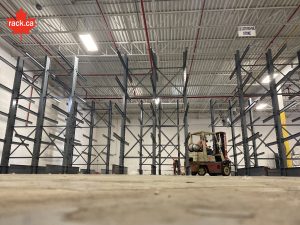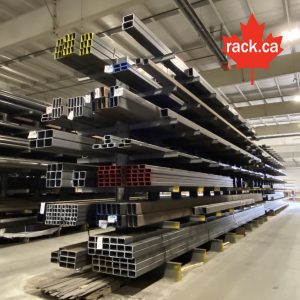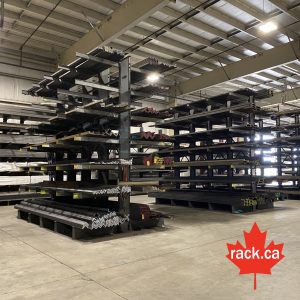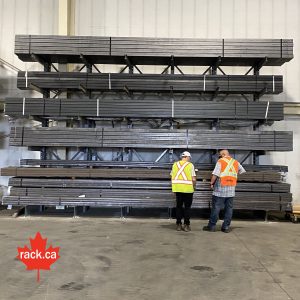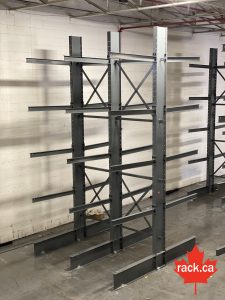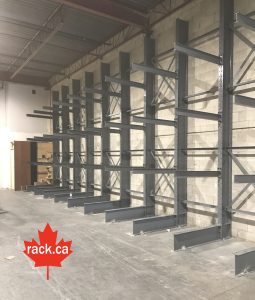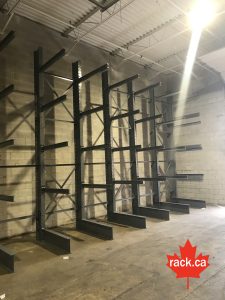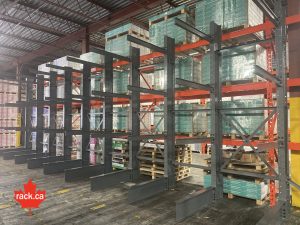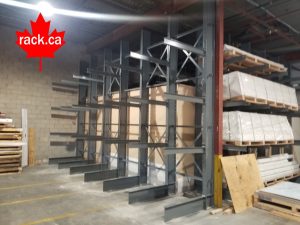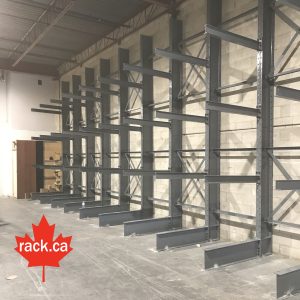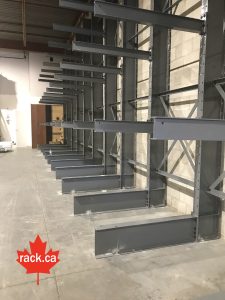Pallet racking systems are usually the go-to storage solutions for many warehouses because they’re easily accessible and are capable of storing a wide variety of products. However, pallet racking systems aren’t fit to handle industrial building materials like pipes, drywall, lumber, tubing, carpeting, etc. These are all heavy and awkwardly shaped materials that require an open-ended storage mechanism for easy and safe access. Cantilever racking systems are the ideal storage solutions for most building materials. Keep reading to learn everything you need to know about industrial warehouse cantilever racking systems and how they work.
How Do Cantilever Racks Work?
Cantilever racks are used to store heavy and oversized items that wouldn’t fit on a conventional pallet racking system. They’re open on all sides for easy material access and consist of four major structural components that make storage of these items possible. There are two heavy steel bases on either end of the structure, which are secured to the ground to prevent the structure from moving.
Vertical uprights on both sides are connected to the steel bases. They act as a support system for the arms, which extend outward the length of the bases. The arms are the shelves on which the products are stored. Lastly, two criss-crossed support beams in the back of the unit provide additional structural durability to support the weight of the racking system and the products stored on it.
Why Should You Use Cantilever Racks?
Warehouse cantilever racking systems are incredibly sturdy and versatile. While they’re mainly used for storing bulky and oddly shaped building materials, they can also be used to store items that are typically stored on conventional pallet racking systems. The arms are fully adjustable and can be widened or narrowed according to the dimensions of your inventory. If your warehouse primarily stores bulky and difficult-to-transport building materials or a mix of building materials and other smaller items, then cantilever racking is a suitable and cost-effective storage solution.
How Does Cantilever Racking Benefit Your Business?
It all depends on the type of inventory you typically have in stock. If you store a lot of bulky and awkwardly shaped items that are difficult to access through storage systems that have a lot of bars and beams on the sides, then cantilever racking is the right solution for your warehouse. Industrial warehouse cantilever racking systems can increase material handling efficiency and productivity by providing easy access to building materials on all sides.
Cantilever racks come in two main configurations: single and double-sided. Single-sided cantilever racks are affixed to a wall. Double-sided cantilever racks are conjoined at the back. Both configurations offer exceptional structural stability, space efficiency, and flexibility. You can also choose between fixed or adjustable arms that can be moved closer together or further apart depending on your needs.
What Types of Forklifts and Planning Are Required for Cantilever Racking Systems?
Standard or side-loading forklifts can be used in conjunction with cantilever racking systems depending on the layout of your storage units. Side-loading forklifts are more suitable for maximizing space in your warehouse and allowing for narrower aisles, so that you can fit more cantilever racking systems. However, cantilever racks are extremely adaptable and can be custom-tailored to the size and layout of your warehouse or storage facility.
How Much Can Cantilever Racking Hold (Weight)?
The weight capacity for cantilever racking systems has no limit. Most cantilever arms can support anywhere from 1,500 to 5,000 pounds, and in some cases, even up to 18,000 pounds per arm. So the more important factor to consider is how much weight can the floor handle?
The good thing is that the floor can be reinforced to accommodate the weight requirements of the racking system.
How Can You Determine a Cantilever Rack’s Capacity?
To get the weight capacity per arm, divide the total weight of the load by the number of arms that will support it. For example, if the load is 5,000 pounds and will be supported by two arms, then the weight capacity per arm is 5,000 pounds divided by 2, which equals 2,500 pounds per arm.
Then, determine the number of arm levels and the total weight capacity required: Multiply the weight capacity per arm by the number of arm levels. For example, if there are three arm levels and the capacity per arm is 2,500 pounds, then the total capacity required for the rack uprights will be 2,500 pounds x 3 = 7,500 pounds.
What Types of Products Can You Store on Cantilever Racks?
Cantilever racking systems can be used to store long heavy items such as metal pipes, steel pipes, steel sheets, plywood, heavy bar stock etc.
How Do You Determine the Correct Height of the Cantilever Rack System?
The correct height of the cantilever rack system is determined by the maximum height and the height of the product being stored.
How Frequently Do I Need to Inspect My Cantilever Rack?
It is recommended to inspect your cantilever rack at least once per a year.
Are Cantilever Racks Interchangeable?
Yes.
Is It Easy to Alter Cantilever Racking After It Has Been Installed?
Cantilever pallets are flexible and can be easily altered after installation. You can adjust the arms and the height.
Is Cantilever Racking Safe for Warehouse Workers?
Cantilever racking systems are safe for warehouse workers when designed and installed correctly. This is why you need a professional. Professionals will ensure that your cantilever rack is installed correctly and in compliance with safety regulations and standards.
How Much Does Cantilever Racking Cost?
Cantilever racks are more expensive than standard pallet racks because they are made of heavy-duty materials, making them solid and durable. Cantilever racks are designed to support long, heavy items like aluminum, pipes, and sheet metal that cannot be stored on traditional pallet racks. Contact Canadian Rack Technologies for the best cantilever racks.
To learn more about the benefits of industrial warehouse cantilever racking systems, contact the experts at Canadian Rack Technologies Inc. We provide a wide variety of state-of-the-art customizable warehouse storage solutions for businesses of all sizes across Toronto and the GTA.
